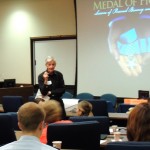Medal of Honor Presentation
We had our own July 4th celebration when the Congressional Medal of Honor Foundation’s staff and two experienced California teachers provided pre-conference seminar attendees with a one-day training program. They focused on “lessons of personal bravery and self-sacrifice” as “a teaching resource designed by teachers to provide students with opportunities to explore” virtues such as courage, patriotism, commitment, integrity, sacrifice, and citizenship.
Forty attendees were thrilled to meet, in person, Jay Vargas, a Medal of Honor recipient, and receive the Foundation’s excellent and comprehensive instructional kit of resources, lessons, DVDs and black-line masters. http://www.cmohedu.org/about_us.aspx
I want to share some representative observations from attendees, which I have edited.
I really felt a connection to the importance of service to others and how character truly counts; it was powerful and meaningful.
Learning about the value of character education has made me determined to add
character education into my classroom’s curriculum. Our nation was founded on the values that exist in service and this should not be forgotten. I feel very humbled to know about several Medal of Honor recipients and their stories, and that they were willing to open up, and at moments be vulnerable in order to share the love, selflessness, respect, and determination that have for their country and friends.
I found the vignettes to be informative and thought provoking: perfect material for my future world history classroom. Beyond the reminders of the costs of war, the seminar encouraged me to reflect on the importance of service to others. I believe that this is truly an important life perspective to cultivate in our students and ourselves.
One of the important things I took from this program, which I think is a good lesson for students also, is that you don’t necessarily need to be special to do something great. The message that I kept getting from the different men in the videos was that they did not think they did anything great or deserved all this attention and honor, they were just doing what they thought was the right thing to do. This is a powerful message because I think it can encourage students to choose to create values and beliefs of what is right.
Character education is something that I am extremely passionate about and will be intertwined throughout all aspects of my future classroom community. In certain classroom environments (potentially upper-elementary through high school), the Medal of Honor Curriculum would be a fabulous way to integrate character education with the study of wartime history.
The seminar provided an opportunity for me to reflect on the character traits of commitment, courage, sacrifice, patriotism, citizenship, and integrity as a person and educator.
As I see it, teachers should use the MOH resources and virtues/traits as a framework to introduce students to the characteristics and stories of heroes and heroines in many fields and professions. Teachers might retain the “medal” theme offering students units and lessons about the “Presidential Medal of Freedom,” the “Presidential Citizens Medal,” the “Liberty Medal” and the “Nobel Peace Prize,” to name a few.
What we are really talking about here is offering young people positive role models that may influence them in their studies, their relations, their behaviors, and their careers.




